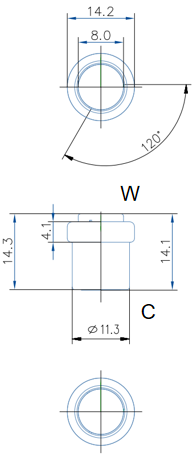
The DSD03-M1K-JH14 is an exceptionally unique electrochemical carbon monoxide (CO) sensor developed and manufactured by Daohe Shun. It is a fuel cell-type sensor where carbon monoxide and oxygen undergo respective oxidation-reduction reactions on the working electrode and counter electrode, releasing charge to generate current. The magnitude of the generated current is directly proportional to the concentration of carbon monoxide and follows Faraday's law. By measuring the current, the level of carbon monoxide concentration can be determined.
Features
High sensitivity, high resolution, linear output.
High stability, excellent anti-interference capability.
Low power consumption, small size, long lifespan.
Environmentally-friendly structural design.
Unique anti-leakage structure.
Applications
* Residential and commercial carbon monoxide monitoring.
* Industrial carbon monoxide monitoring.
* Indoor parking carbon monoxide monitoring.
* Generator carbon monoxide monitoring.
* Smart home carbon monoxide monitoring.
Dimensions
Figure 1: Sensor Structure Diagram

Main Technical Specifications
Product Model | DSD03-M1K-JH14 |
Detected Gas | Carbon monoxide |
Concentration Detection | 0~1000ppm |
Overload detection | 2000ppm |
Output information | 1.5~3.5nA /ppm |
Repeatability | ±2% |
Resolution | 0.5ppm |
Response time (t90) | ≤60 Seconds |
Long-term drift. | <2% / Month |
Recovery time. | ≤60 Seconds |
Expected lifespan. | 10 years |
Operating temperature. | -20~50℃ |
Operating pressure range. | 0.1Mpa ±10% |
Recommended load resistance. | 1KΩ |
Physical dimensions. | 14×14.8m(D×H) |
Bias voltage. | No specific requirement. |
